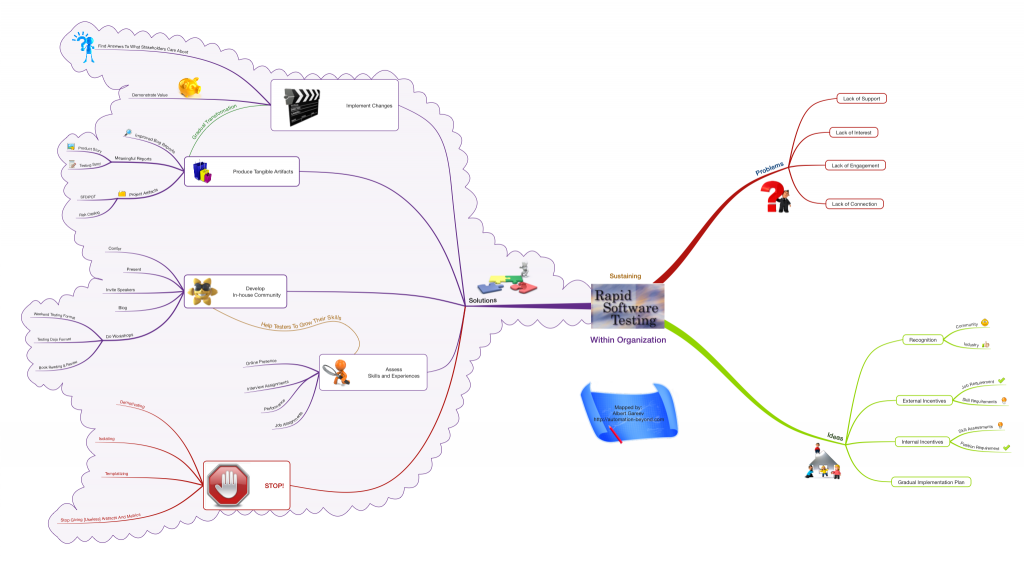Notice
This post and mind map are work in progress. I’m hoping to get the community feedback as well as further refine the ideas myself.
Stay tuned. See more contents below the mindmap.
Below is the mindmap in [accessible] list format with my comments elaborating the points.
Problems
You’re a Test Manager. You had your team taking one of the best practical courses in testing. How do you make it stay and what are the problems? See also here.
Corporate training is a serious investment – of funds, but also project time and reputation of the manager arranging the training. And there will be expectations. To make a return of investment, one should consider means to increase “germination of skills” after the training.
Lack of Support
Lack of Interest
Lack of Engagement
Lack of Connection
Ideas
Recognition
I think, recognition within the community is pretty good. But within the industry – not really. This topic is an idea for brainstorming itself. As a quick thought, promotion of RST brand can (should?) be done in connection to products. You know – “this blog is powered by WordPress”, “runs on Yahoo servers”, etc. Of course, the trick is in virtually no difference between well-tested and untested software.
Community
- Context-Driven Testing community
- Agile Testing community
Per my observation, there’s a degree of misalignment with the two and within those, but the direction is common.
Industry
This is currently a weak spot. Somewhat like a brand would greatly help – to make RST distinguishable and to ward off meaningless certification and standardization schemes.
What’s important to emphasize is the trap of easyness of binary assessment: if got [certification, training, etc.] -> qualified for the position.
External Incentives
“Demand – supply” is a proven instrument. Having set RST course as an asset and skills it teaches as mandatory both adds up to industry recognition and quality level of the candidates.
Job Requirement
Hiring process is really flawed, and many recruiters write about it. But let’s be part of the solution here, and create right job descriptions. Set right requirements. Educate recruiters on what we need. To be practical: I’ve used this example in recent hiring cycles.
Skills Requirements
- Too often, almost always, job requirements require tool and technology knowledge instead of skills. But what matters is what testers make out of them. Tools don’t make the master.
- Too often, almost always, job requirements specify delivery of artifacts with questionable value.
- Too often, almost always, job requirements describe the motions testers go through, and only visible part.
Elaboration on the real testing skills would help both recruiters and job seekers. Recruiters will know what to look for and how to evaluate. Job seekers will know what skills to work on.
Internal Incentives
Position Requirement
Skills Assessment and Development
Gradual Implementation Plan
Solutions
Implement Changes
#GradualTransformation
Find Answers To What Stakeholders Care About
Demonstrate Value
Produce Tangible Artifacts
#GradualTransformation
Improved Bug Reports
- Problem Statement
Meaningful Project and Product Reports
- Product Story
- Testing Story
Useful Project Artifacts
- SFDiPOT
- Risk Catalog
Develop In-House Community
#GrowSkills
Yes, many employees don’t go to external events, but they still socialize a lot inside of the company. So in the big enough organization one could run internal meetups. (For small organizations, this might be a problem, but I assume that small fast-paced companies have different, typically quite active kind of employees, so going external won’t be a problem for them).
Confer
Present
Invite Speakers
Run Blogs
Do Workshops
Rapid Software Testing course and workshop is qualitatively different because of vast amounts of practical ideas, tricks, techniques, methods, and eye-opening exercises. It is very fast-paced. Highly condensed knowledge. In fact, it’s so un-academical, that adding theory afterwards would help people, because they need to un-learn and re-learn a lot. And while independent course takers usually have that drive taking them further, corporate course takers may need continuous support.
- Weekend Testing Format
- Testing Dojo Format
- Group Reading and Reviews for books and articles
Assess and Grow Skills and Experience
#GrowSkills
Hiring
- Online presence
- Hands-on (and brains-on) interview assignments
Employees
- Performance in context
- Job assignments
